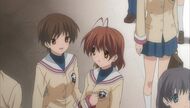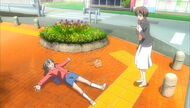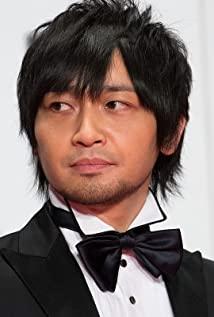Thoughts on the first season
Let's talk about the second season.
In the second season, the main line is that Okazaki Tomiya left the campus life and went to society as the main line. In the first season, Tomoya Okazaki and Nagisa Furukawa warmed up their relationship. Not only did they often go to the Furukawa house for a meal, but they finally lived in the Furukawa house. This is of course closely related to Pengye's own "homeless" state. Tomoya's father often drinks unconsciously at home, and occasionally sobers up. The dialogue between Pengya and his father is also separated by a thick barrier. Add a "jun" word, which is called by outsiders. Peng also felt that his father didn't take him seriously as his son, and all he saw when he got home was his father's alcoholic and decadent appearance, and he couldn't give him any "home" feeling. In the first season, Tomoya is often "homeless" after school, either wandering aimlessly in the small town, or going to kill time with his good brother Chunhara Yohei. After getting to know Furukawa Nagisa, I realized that "family life" is so warm.
I have to mention here what kind of existence the Furukawa family is in Clannad. The Furukawa family is often referred to as the "Furukawa Guest House" in the barrage. This is because Furukawa often helps friends who are homeless, or friends who have nowhere to stay for the time being, by letting them live in their own homes. And Nagisa Furukawa's parents, Furukawa Qiusheng and Furukawa Sanae, are very kind people, and they look a little silly. They treat their daughter's friends living at home as if they were family members of their own. In this sense, "Furukawa Guest House" in Clannad is like an existence that can heal wounds and give warmth. After Tomoya moved into Furukawa's house as a friend of Nagisa Furukawa, he truly experienced the warmth of "family life". This warmth changed Tomoya in a subtle and profound way.
In the second season, Tomoya graduated from high school, and Nagisa Furukawa had to drop out of school because of the approaching winter and was weak, and had no choice but to repeat the grade. The two have also officially dated and become a couple. Tomo also moved away from the Furukawa family during this period, rented an "old and small" apartment, and asked Ibuki's husband, Yoshino Yusuke, to join Yoshino's "electrician" job. The job content is to climb utility poles all day long and repair cables. When Tomoya first started working, he was like a young man who was anxious to "grow up". He put away his sloppy appearance and began to attend work on time, learn how to greet each other and talk about "honor". In Japanese society, people generally use "honor", or "courtesy language", to express politeness in work scenes or public life. The opposite is the "normal body", generally speaking to good friends or family members, it is less polite, and it sounds more straightforward.
As mentioned above, the "family life" experienced at the Furukawa family has a profound impact on Okazaki Tomomi, which is reflected in Okazaki's work. When Okazaki first entered the society, he gave the impression that he was not a sloppy gangster, but a person who was trying to become a responsible adult. However, let’s assume another way. If Peng also didn’t meet Furukawa Nagisa and still lived in his previous home, and maintained a state of “homelessness”, would Peng also actively participate in social life? The most likely situation is that Peng will also continue the state of being a gangster to work, being a fool, unable to find a formal job, working part-time as a part-time job, and barely able to make ends meet. In fact, such people are very common in Japanese society. Without the warm family life of the Furukawa family, Okazaki might not have adapted to the society and lived hard with such a humble attitude. After Okazaki left the Furukawa family and rented his own "old and broken" apartment, Furukawa Nagisa often came to visit and cook, Okazaki got off work, and Furukawa got off school. The two ate together at home, like a newlywed couple. This is a very warm scene in Clannad.
And Nagisa Furukawa's second grade repeat life was not as smooth as the first time. In the first season, Tomoya Okazaki and Nagisa Furukawa worked hard to rebuild the drama club, but the classmates who joined the drama club were basically high school seniors. As soon as Tomoya graduated this year, the drama department was facing abolition. One year after Tomoya graduated, for Nagisa Furukawa, it was the real life of repeating grades, it was difficult to integrate into the class, and there was no club life. But at this time, Nagisa Furukawa has grown a lot compared to the way she was on her way to school a year ago. She has become stronger, and she even sees her friends who are so busy with work that she can't even attend the "cultural festival". No complaints. In the second season, Nagisa Furukawa's strength and virtuousness, like symbols like "Yamato Nadeko", played a perfect "Japanese wife" image. In reality, especially after entering Heisei, such a stoic, virtuous, kind and gentle "Yamato Nadeko" can be said to be an endangered species, or a projection of a wishful male perspective in a patriarchal society. But there is no doubt that the strength shown by Nagisa Furukawa in the second season is inseparable from the support of Nagisa Furukawa and his new friends in the first season. Rebuilding the drama department, performing plays at cultural festivals, and interacting with friends all gave Nagisa Furukawa, who was not good at interacting with people, confidence. So it's no wonder that when Tomoya graduated, the head teacher Yukimura said to Tomoya, don't worry, this kid is much stronger than you think.
With Nagisa Furukawa's graduation, the two finally got married, and they were still in that "old and broken" rental apartment. During the Chinese New Year, their high school friend came to visit, and Nagisa Furukawa was pregnant at this time. Tomoya's good brother Haruhara is curious about their thoughts on having children, but Tomoya's answer is also so-so, far from the "mature" he envisioned before. Haruhara and his friends all laughed. They originally thought that Tomoya and Nagisa Furukawa, their peers of the same age, were "ahead" in their life stages due to their marriage and pregnancy, but they didn't expect that they didn't actually "go far". of joy.
Next, the tragedy that clannad showed was unrelenting. Furukawa Nagisa was about to give birth, and it was snowing heavily. He couldn't go to the hospital, so he could only give birth at home. The mother is Furukawa Nagisa, and the body is weak, and the price of giving birth to a child is her own life. All the hopes of Tomoya's life were originally pinned on him being able to form a family of his own, but the death of his beloved wife completely shattered his hopes of life. He had no intention of taking care of the child, so he fostered the child in the Furukawa family, immersed himself in his work, started drinking and smoking, and played "pachinko machines" to kill time. Five years after his wife's death, Peng also wasted five years like this, with unshaven beard and dull eyes. Who does it look like? That's right, Tomoya's father.
One day five years later, Sanae Furukawa, the mother-in-law, deceived Tomoya into the Furukawa house, while she and her husband Qiusheng left home so that Tomoya and his daughter, Shio Okazaki, could spend some time alone. A useless father, who has not taken care of his daughter for five years, began to be alone with his daughter, and he felt uneasy, as one can imagine. But after all, she is her own daughter, not someone else's child. Her daughter's desire to travel is what moved her friend. Peng also took her out for a trip. On the way, he took the train, bought toys, and stopped in a flower field. Along the way, the two have maintained a delicate distance, neither recognizing the birth nor being intimate. When riding the train, Tomoya scolded his daughter loudly because of the noisy child next to him, and scared his daughter away, only to find Shio Okazaki hiding in the toilet and crying. Tomoya at this time was not quite a "father", he neither understood other people's children nor his own.
After arriving in the flower field, Tomoya watched his daughter, Okazaki Shio playing in the flower field, and suddenly remembered a scene that he had known when he was a child. He thought of his father. Tomo also felt as if he had been to this flower field when he was a child. He began to look around this flower field, trying to retrieve some memories of his childhood. At this time, he met his father's mother in a dramatic way, and was told how his father insisted on bringing up his friends after losing his wife, even though his life had collapsed in half. At that moment, he suddenly understood the "waste wood" father who seemed to drink heavily every day. He suddenly knew that compared with the father who insisted on bringing friends by himself, he fostered his daughter Okazaki Shio in the Furukawa family, and he didn't pay attention for five years. cowardice. He has completely changed his view of his father, and at the same time, he finally knows what a "father" is. After this trip, Tomoya takes Shio Okazaki back to his home and reconciles with his father. In this process, the foreshadowing that was rolled out in the first season was finally connected, and the role of Tomoya was also very three-dimensional and full.
In the first season, the theme of the intergenerational "life goals" that revolved around Nagisa Furukawa's reconstruction of the drama department was put on Tomoya in the second season. Peng also realized the hardships of his father who raised him as a widower through the loss of his wife. The various plots in the second season are like giving Okazaki Tomoya a thorough psychotherapy, allowing him to understand that his original family is not unfortunate, but his father has paid great patience and effort, but he did not see it. , didn't understand it.
It seems that the work of clannad is talking about parent-child relationship and family relationship. The story seems to be that an unfortunate person suddenly got happiness, but could not protect this happiness. In the end, in a state of "unfortunate", he understood that his previous "unfortunate" was not real unhappiness, but accompanied by great patience and hard work. , with unspeakable love.
But this story can be told a little bigger. In Clannad, the stage is a small town, whether it is Okazaki Tomomi or Furukawa Nagisa, they are all small town youths. In Clannad, we can't see any strong desire to "rise in class", young people in small towns are not eager to go to big cities, and young people in small towns are not eager for higher education. Of course, this is an anime work, adapted from a game, which is an alternate story. However, there is still a huge difference between such young people in small towns and the well-known "North Drifters", "Dwellers" and "Sanhe Great Gods".
Japanese society is an academic society. When they say academic qualifications, they refer to the "school calendar" more importantly. Being born in a prestigious school, graduating into a big company, or finding a decent job, such as a civil servant, is a common pursuit of young people. At the same time, similar to the "North Drift", young people from Japan went to Tokyo to seek a living, called "Shangjing". And since World War II, the road to "going to Beijing" has not been broken. In recent years, the decline of the elderly and the declining birthrate has intensified. Compared with being bored in the local area, "going to Beijing" is an important way for young people to realize their ideals in life.
The people in Clannad, on the other hand, were born and raised here, live and work in small towns, and don't seek high degrees or big companies. Okazaki Tomomi can also be happy with Furukawa Nagisa, even if it is an "old and broken" rental apartment, even if it is a hard and tiring "electrician" career that climbs telephone poles, it doesn't matter. Many people feel that Clannad has taught them an important lesson in life, not only referring to the previous re-understanding of the parent-child relationship, but also the disenchantment of this modern society's definition of "getting ahead". Compared with "moving away from home and getting ahead", it is more attractive to have a wife and children in the hometown where you grew up.
Is it vulgar? Seems like this kind of value looks pretty vulgar, doesn't it?
But what is the purpose of "leaving from home and getting ahead"? To live decently? To look like a middle class?
Is the definition of "success" in modern society inherently problematic? Paul Fussell once ruthlessly ridiculed the pseudo-middle class in his book The Style. Only those pseudo-middle-class people care most about how others "recognize" their middle-class status. And their "decent life" is based on the psychological foundation of "getting what you earn", which is actually not very elegant. Arty, with its appearance, the same vulgar, and hypocritical.
The values displayed by Clannad are extremely traditional and conservative in modern society, and it regresses to primitive family life, small community life, and even life before globalization and modernization. What it attempts to awaken is the rediscovery of family life in the hometown and small town, rather than abandoning the family to work hard or leaving home to "float" in the big city. Even if we don't agree with Clannad's values, it is enough to reflect on the myth of "Leaving one's home and getting ahead" in modern society from this level.
In modern society, hometown, family, traditions, environment seem to be dissipating everything that was once indestructible. The same is true for the small town of Clannad. The cherry tree road at the entrance of the campus will be cut down, the place that used to be a forest will be cut down to build a hospital, the former vegetable market will be replaced by a supermarket, and the chain stores will run on local self-employed businesses, to name a few. A common line in Clannad is that the town is constantly changing. This is an essential feature of modern society. Just like the "construction site" that is most often seen in Chinese cities anytime, anywhere. Modern society is built on this kind of "construction site" anytime, anywhere. If it is not for construction, then modern society is like denying its own meaning, leaving empty buildings, deserted villages, and On the surface invisible aging and declining birthrate.
Living in such a world, choosing which values to choose is of course personal freedom. The values presented by Clannad are an ancient tradition, which has not completely disappeared in modern society, but is covered up by various myths or fashionable trends. This is not to say that such an ancient tradition is a cure for the problems of modern society, but Clannad offers another possibility of social life, which still has the great power to move the hearts of countless people.
View more about Clannad: After Story reviews











